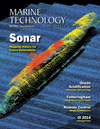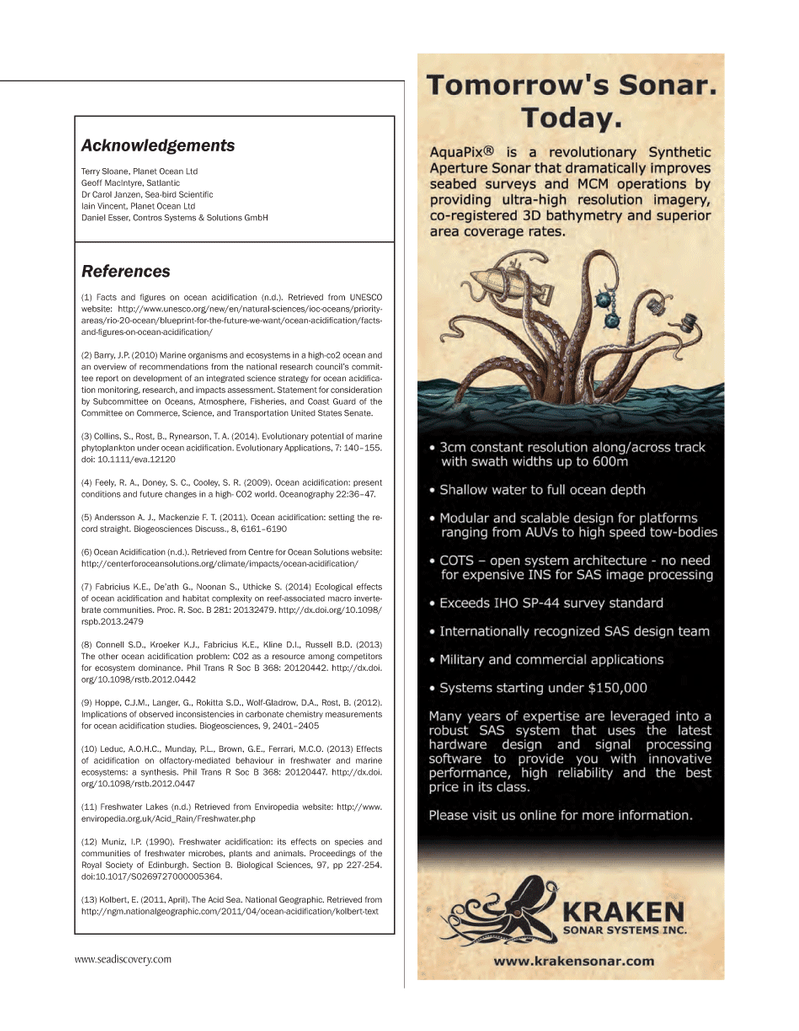
Page 51: of Marine Technology Magazine (March 2014)
Instrumentation: Measurement, Process & Analysis
Read this page in Pdf, Flash or Html5 edition of March 2014 Marine Technology Magazine
Acknowledgements Terry Sloane, Planet Ocean Ltd Geoff MacIntyre, Satlantic Dr Carol Janzen, Sea-bird Scienti Þ c Iain Vincent, Planet Ocean Ltd Daniel Esser, Contros Systems & Solutions GmbH References (1) Facts and Þ gures on ocean acidi Þ cation (n.d.). Retrieved from UNESCO website: http://www.unesco.org/new/en/natural-sciences/ioc-oceans/priority- areas/rio-20-ocean/blueprint-for-the-future-we-want/ocean-acidi Þ cation/facts- and-Þ gures-on-ocean-acidiÞ cation/ (2) Barry, J.P. (2010) Marine organisms and ecosystems in a high-co2 ocean and an overview of recommendations from the national research council?s commit- tee report on development of an integrated science strategy for ocean acidi Þ ca-tion monitoring, research, and impacts assessment. Statement for consideration by Subcommittee on Oceans, Atmosphere, Fisheries, and Coast Guard of the Committee on Commerce, Science, and Transportation United States Senate. (3) Collins, S., Rost, B., Rynearson, T. A. (2014). Evolutionary potential of marine phytoplankton under ocean acidi Þ cation. Evolutionary Applications, 7: 140?155. doi: 10.1111/eva.12120 (4) Feely, R. A., Doney, S. C., Cooley, S. R. (2009). Ocean acidi Þ cation: present conditions and future changes in a high- CO2 world. Oceanography 22:36?47. (5) Andersson A. J., Mackenzie F. T. (2011). Ocean acidi Þ cation: setting the re- cord straight. Biogeosciences Discuss., 8, 6161?6190 (6) Ocean Acidi Þ cation (n.d.). Retrieved from Centre for Ocean Solutions website: http://centerforoceansolutions.org/climate/impacts/ocean-acidi Þ cation/ (7) Fabricius K.E., De?ath G., Noonan S., Uthicke S. (2014) Ecological effects of ocean acidiÞ cation and habitat complexity on reef-associated macro inverte- brate communities. Proc. R. Soc. B 281: 20132479. http://dx.doi.org/10.1098/ rspb.2013.2479 (8) Connell S.D., Kroeker K.J., Fabricius K.E., Kline D.I., Russell B.D. (2013) The other ocean acidi Þ cation problem: CO2 as a resource among competitors for ecosystem dominance. Phil Trans R Soc B 368: 20120442. http://dx.doi. org/10.1098/rstb.2012.0442 (9) Hoppe, C.J.M., Langer, G., Rokitta S.D., Wolf-Gladrow, D.A., Rost, B. (2012). Implications of observed inconsistencies in carbonate chemistry measurements for ocean acidi Þ cation studies. Biogeosciences, 9, 2401?2405 (10) Leduc, A.O.H.C., Munday, P.L., Brown, G.E., Ferrari, M.C.O. (2013) Effects of acidiÞ cation on olfactory-mediated behaviour in freshwater and marine ecosystems: a synthesis. Phil Trans R Soc B 368: 20120447. http://dx.doi. org/10.1098/rstb.2012.0447 (11) Freshwater Lakes (n.d.) Retrieved from Enviropedia website: http://www. enviropedia.org.uk/Acid_Rain/Freshwater.php (12) Muniz, I.P. (1990). Freshwater acidi Þ cation: its effects on species and communities of freshwater microbes, plants and animals. Proceedings of the Royal Society of Edinburgh. Section B. Biological Sciences, 97, pp 227-254. doi:10.1017/S0269727000005364. (13) Kolbert, E. (2011, April). The Acid Sea. National Geographic. Retrieved from http://ngm.nationalgeographic.com/2011/04/ocean-acidi Þ cation/kolbert-text www.seadiscovery.com MTR #2 (50-65).indd 51MTR #2 (50-65).indd 512/21/2014 11:26:11 AM2/21/2014 11:26:11 AM

 50
50

 52
52
